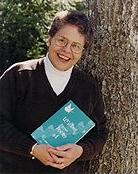On Lovejoy's Pond
By
LC Van Savage
In winter when the happy news finally came that the Lovejoy's Pond had frozen thick enough, all the kids would race home from school, grab their skates and head out. The Lovejoys, good people, would have already shoveled the ice for them and smoothed the surface with spray from their garden hose.
The kids would skate for endless hours, and when it became dark, they'd skate by the streetlamps shining over the old, tall wall around the pond, or sometimes by moonlight which turned that frozen place into an enchanted land of translucent, frosted silver.
The Lovejoys would watch over the children through their lace curtains, and sometimes on Sunday afternoons would come out themselves to the pond and skate in their old, stained and cracked skates.
She was so small next to him, and he, tall and bony, would hold her in the old-fashioned dancing skater's way, and they'd glide around that pond in perfect synchrony, side by side, moving to music only they heard. He'd smile tenderly down at her and she up at him, her head resting on his shoulder. The kids would sit on the sides of the pond and watch, and when the Lovejoys slid past them in graceful glissade, their skate blades making soft, ice-slice noises, Mrs. Lovejoy would look over and whisper a smile at them all.
And then one night a young child could not undo a knot in her laces and her treacherous friends left her there at the pond's edge, and she watched them get smaller in the streetlamp light as they walked back home in a crowd, their breaths joining in a single white cloud above them as they laughed and chatted. They never once looked back to see if she'd catch up, and their laughter came back in the darkness like pieces of thin, broken ice, and fingers of cold pushed relentlessly into her clothing and pinched hard at her skin. It was very dark.
She wept there by the pond, now a black mirror, and the tears froze to her cheeks and hurt there. She tugged frantically, but could not break the razor wire lace.
His strong arms gathered her against him and carried her up the hill to his brick house, and when Mr. Lovejoy pulled her into his kitchen, she felt the warmth of that room pour over her like heated molasses. He put her on a wooden kitchen chair, knelt and cut off her skates and pushed a pair of his own thick, woolen socks on her numbed feet. He said he'd already tried to call her parents, but there was no answer. He'd try again.
Mrs. Lovejoy came in then, and pulled off the child's jacket murmuring softly, and then placed a thick white mug in her frozen hands, and the cocoa burned her tongue and throat and tasted as if made by angels.
And then she was before the fire in their livingroom wrapped in Mrs. Lovejoy's thick hand-made afghans. The tiny woman moved around her like a small, worried bird, clucking, whispering, tucking the blankets about her. She felt warm and safe there.
Mrs. Lovejoy walked to a wooden chest in the corner and slowly pulled out colorful story books, and walked toward her, cradling them in a stack against her, like a baby. She sat next to the small girl on the floor, and in a soft voice, like moth wings fluttering, began to read ancient stories. The child dozed and listened and soon Mrs. Lovejoy put her arm around her as she read and her head fell against the woman's thin shoulder and she felt as if she were melting. She looked up at Mr. Lovejoy sitting in his big chair across the room. He was leaning forward, watching them, smiling, but it seemed not a happy smile. It was one she'd seen people smile when they are trying to hide that they're really crying.
Her father's angry hammering on the front door brought them all to their feet in a staggered jerk, livid because she hadn't returned with the other kids. The afghans fell to the floor in a mottled puddle, and Mrs. Lovejoy, frightened, gathered up all the old books, clutched them to her, and faded into a shadowed corner.
Mr. Lovejoy explained calmly to her father what had happened, that he'd tried to call before and had intended to call again.
Her father's breath came in angry, white bursts in the streetlamp as he led her back home, the wounded ice skates hanging from her mittened hand and clinking together. As she trotted behind him, she tried to tell him how good the Lovejoys had been, how her pals had abandoned her, of how the older couple had warmed and fed her, read her stories from really old books.
"Oh, those old books probably belonged to their kid who died," her father yelled over his shoulder. "He fell into the pond when they weren't looking and drowned. They shouldda filled it in years ago when it happened. Why the heck do they keep that old pond, anyway?" He shook his head and walked more quickly in the dark cold.
But when she was older, she knew why. She understood that the sight of that pond must have caused the Lovejoy's excruciating grief when they gazed at it, unable to not recall the melancholy summer day their beloved son slid beneath the glistening surface and died. They would never fill it in_. They kept the place of their child's summertime death alive to give wintertime joy to other people's children, knowing it was the best possible legacy their dear son could leave behind.

|
Click on author's byline for bio and list of other works published by Pencil Stubs Online.
Email LC at lcvs@comcast.net or
lcvansavage@newmainetimes.org
See her on incredibleMAINE, MPBN,
10:30 AM Saturdays
|
|